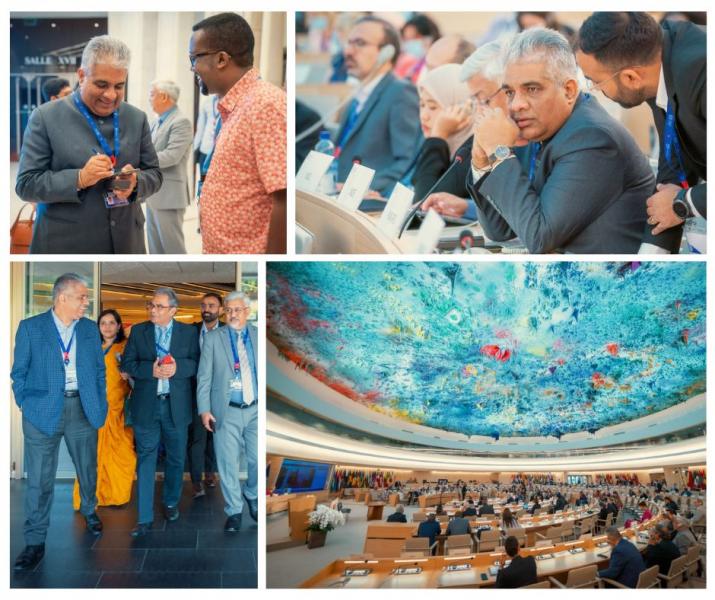
International Labour Conference Diary: World of Work (Promoting Human-Centered Recovery and Resilience)
11/06/2022
BLOG
Read in English | Read in Hindi
About a fortnight after it started, the 110th International Labour Conference organised under the auspices of the International Labour Organisation ended today in Geneva. With representatives of governments, workers and employers from 187 ILO Member States in participation, the Conference ended on a positive note.
Over the last two years, the world has been struck by an unprecedented crisis in the form of the global Covid pandemic which brought life and livelihood to a standstill. The ILC, therefore, chose to focus on a human-centric recovery given that the pandemic widened inequalities and digital divides.
The pandemic impacted both employers and employees. It also impacted government policies worldwide as unemployment spiked in the wake of successive lockdowns and the fear of the resurgence of the infection loomed.
It was therefore fruitful that the International Labour Conference could bring together employers, employees, government and social sector representatives on a platform to hear and be heard.
Participants agreed that there should be a human-centric recovery and that it is possible only through ensuring decent work which involves opportunities for work that is productive and delivers a fair income, security in the workplace and social protection for families, better prospects for personal development and social integration.
Decent work is work which ensures not just two square meals a day but a life of dignity and creates room for aspirations to soar. With that aim, the ILC discussed not just security for formal sector workers but also, and especially, those in the informal or unorganised sectors. There were discussions around the welfare of those who form the nursing staff and also domestic workers in a holistic way. Delegates emphasised that we not only need to ensure people get jobs but also that they are paid minimum wages and that the minimum wages should factor in inflationary pressures. There was a general understanding that security in the workplace is of paramount importance for all our workers.
One important aspect that came up for discussions was that climate change will in due course impact some more than others and also some will be affected sooner than the others. The understanding was that these vulnerable groups must be protected and that policy frameworks must factor in the problem of how climate change is going to affect employment opportunities in the future and to provide workers a social framework to act as a bulwark for them.
Delegates agreed that Covid impacted women workers harder and also that challenges such as the climate crisis will affect our women workforce more. There was a general understanding that governments should make women-centric policies in the sphere of labour reforms and legislations.
In India, the National Career Service is doing that by keeping women at the forefront of the efforts to provide employment. On e-Shram, a portal created in August 2021 to register unorganised workers, out of nearly 280 million registered workers nearly 53 per cent are women and 47 per cent are men. The portal in the years ahead will contribute towards 100 per cent saturation of welfare schemes. The registration of women in such large numbers will ensure they are not left behind.
A key concern raised during the deliberations was that of the skill gap facing the world. The gathering agreed that apprenticeship is the way ahead to address this skill gap. Historically, apprenticeships have been viewed as a means to facilitate the school-to-work transition for young people. In the context of a today’s world where technology is evolving by the minute, the apprenticeship model needs to empower not just the youth but also older workers to acquire new skills, reskill and upskill through their working lives.
India adopted the Apprentices Act in 1961 to provide for the regulation and control of training of apprentices and for matters connected therewith. We remain committed to skilling our workforce to bridge the skill gap. India is providing training to a large section of the population which enables them to pick up job opportunities.
The pandemic proved to be a disaster for many small enterprises that are run either by individuals or by a small number of people. The government in India, under the dynamic leadership of Honourbale PM Shri Narendra Modi, has been making sector-specific policy interventions to address their concerns and to help them stand back up on their feet.
Strong domestic economic foundations have helped India outdo other nations in this recovery process. With schemes like the Swanidhi Yojana and Pradhan Mantri Shram Yogi Maandhan Yojana and through distribution of free ration to 80 crore people, the government is ensuring that the recovery in human-centric and equitable.
The delegates I met were appreciative of India’s efforts and strides in achieving this feat.
The Conference urged the developed world which has by far prospered at the cost of its developing counterpart to reach out with the promised help in terms of making finance and technology available to those left behind. The delegates agreed that poverty anywhere is a threat to prosperity everywhere.
In a significant step for the world, for the first time an African, Gilbert F. Houngbo, from Togo, will take over as the Director-General of ILO as the term of Guy Ryder comes to an end in October. The move is likely to add heft to the voice of countries that have been left behind in the economic development race.
During my three-day participation in the event, I managed to interact closely with the delegates from India from across the spectrum. We agreed to work with greater zeal towards improving the lives of the Shram Yogis of India and be a responsible world partner in negotiating on issues of global migrant workers.
With these developments, it was curtains down on the 110th ILC in Geneva, a city that has been the scene of numerous negotiations and agreements since the end of the Second World War. Before the Labour Conference, Geneva was hosting the 75th World Health Assembly and the 12th WTO Ministerial Conference starts in the city tomorrow.
